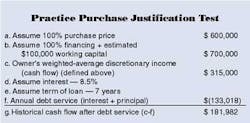Production and cash flow
John Cahill
As practices become larger, the two predominant questions that arise from a buyer's perspective are:
1) Can I produce what the seller is producing?
2) Can I afford this practice?
To address these questions, a buyer needs to dissect the seller's current production and collections and evaluate his or her capabilities and level of skills. For each prospective buyer, the answer will be somewhat different.
First, ascertain what the practice is producing and collecting. Hopefully, collections will be approximately 97 to 98 percent ... or higher. Let's assume that the practice's gross revenue is $900,000.
In addition to knowing the gross revenue of the practice to be purchased, you need to know the adjusted net income. Adjusted discretionary income is defined as the income generated from the practice — after all necessary business expenses — plus any expenses attributed to the owner/doctor, but before taxes.
You also should evaluate the hygiene-production portion of the practice vs. the owner/doctor's production. With a well-run hygiene department, approximately 20 to 30 percent of the practice's total gross revenue may be from hygiene. In our example, using an average of a 25 percent production increase for hygiene, we would show the following results:
If the buyer practices five days per week, 48 weeks per year, the total doctor work days would equal approximately 240 days. Dividing $675,000 by 240 days gives you $2,812.50 per day of doctor production. Clearly, this is an achievable objective for most potential buyers.
With the initial question answered, the prospective buyer needs to address the second major concern — can I afford to buy this practice? (See justification test below.)
Provided the cash flow after debt service is equal to or close to what the prospective buyer can earn as an associate, then this would indicate that the price being paid for the practice would be a fair price when all facts are considered. A buyer paying cash for a practice would realize a reasonable return on his/her investment. This assumes that the practice is operated prudently and there are no unforeseen, adverse changes in the economic condition affecting the practice, the market, or the industry of dentistry. All "due diligence" on any practice comes down to these two major issues.
A prospective buyer should remember to "see the forest through the trees" and not become distracted by what can be insignificant facts. If he or she can handle the production and the practice cash flows, then the practice is priced reasonably in most situations. By paying the seller the asking price, or close to it, you will gain far more in terms of goodwill by allowing the seller to exit the practice with his dignity and with respect for the buyer.
John M. Cahill, MBA, of John M. Cahill Associates has more than 30 years of experience in the dental industry, including all aspects of appraisal, sales, purchases, and buy-ins in connection with dental transitions. Cahill is a member of American Dental Sales, Inc., and can be reached at (510) 844-0330 or by email at [email protected]. See the classified ads for names and addresses of ADS members in your area.


